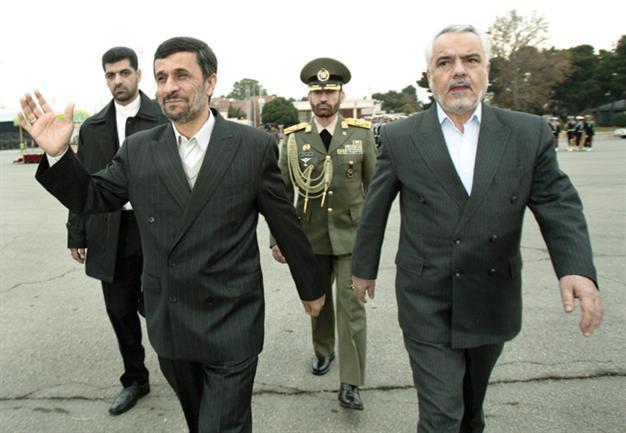Tehran threatens Ankara with new missile system
TEHRAN

Iranian Vice-President Mohammad Reza Rahimi (R) accompanies President Mahmoud Ahmadinejad in his departure ceremony in this 2009 photo.
Iran has produced an anti-radar missile that can strike any source of radar, a top Iranian army official has said, in a reference to the NATO radar system in Malatya, as Iran began
war games to demonstrate its military might.
Revolutionary Guards Gen. Amir Ali Hajizadeh said the message of the maneuvers, dubbed The Great Prophet 7, was to “adventurist” nations in the region and the West, and that Iran would “respond to any possible evil” in a “strong and crushing” way.
He said the maneuvers were aimed at assessing the accuracy and effectiveness of warheads and systems. According to Hajizadeh, the drill, which will include short, medium, and long-range missiles of a variety of models, is being held as part of the Iranian Air Force’s annual exercises. The announcement coincides with the beginning of an EU oil embargo meant to put pressure on Iran over its nuclear program.
Draft bill to block Hormuz
The general also said Iran had produced an anti-radar missile called “Arm” that can hit any radar source. He said the weapon could travel at several times the speed of sound, had an estimated range of 300 kilometers, and could “damage” missile shields in
Turkey and Gulf countries.
“This radar was not built to ensure the security of that country, but to protect the Zionist regime. We have developed ‘Arm’ to counter the air-defense radar,” Hajizadeh said.
NATO’s missile shield uses a U.S. warship carrying interceptors in the Mediterranean and a Turkey-based radar system under NATO command from Ramstein, Germany. Apart from Turkey, Spain, Romania and Poland have also agreed to host key U.S. missile-defense assets.
Meanwhile, Iran’s National Security and Foreign Policy Committee has drafted a bill calling for Iran to try to stop oil tankers from shipping crude through the Strait of Hormuz to countries that support sanctions against it, a committee member said yesterday.
“There is a bill prepared in the National Security and Foreign Policy committee of Parliament that stresses the blocking of oil tanker traffic carrying oil to countries that have sanctioned Iran,” Iranian MP Ibrahim Agha-Mohammadi was quoted by Iran’s parliamentary news agency as saying, according to Reuters. “This bill has been developed as an answer to the European Union’s oil sanctions against the Islamic Republic of Iran.”
